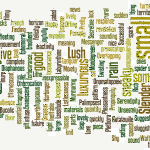February 3, 2014
10 Tips Plus One More About Beautiful Words
 If I could only recommend two books about words to writers, it would be:
If I could only recommend two books about words to writers, it would be:
- The Lexicon by William F. Buckley Jr.
- The Oxford Essential Dictionary of Difficult Words
Both are for those atavistic autodidactic souls who love Beautiful Words. Not ordinary words, or syntax, or grammar and spelling, nor the ebb and flow of a well-written sentence (as charming as is such a creature). You will discovered that the U-shape created by a cord hanging from two fixed points is a ‘catenary’ and a ‘deipnosophist’ is someone you’d gladly invite to dinner (for their robust conversation). These two books are for bibliophiles, focusing on words that make you want to find a spot in daily conversation where they fit. Because they are filled with meaning, emotion, texture, sizzle. If I say, “The susurrus sound of shushing winds…”, do you even care what ‘susurrous’ means? No–be honest. All you care is that it’s a d*** beautiful sounding word.
That’s what’s in these two books. Here are ten tips on how to get the most out of them after they’ve assumed pride of place on your writer’s bookshelf:
- Take time every day to crack one or the other open, read a few words, let them rattle around in your brain like caged birds, and then delve into your subconscious. You’ll find yourself relaxing, smiling, understanding that life most assuredly can get better than sitting at a desk working for the Man.
- Become familiar with words appropriate to your life, interests, hobbies. Know the right way to say ‘snow’ if you’re in Alaska or the one word that characterizes a child who tends to cause trouble (fractious). There is nothing that says ‘philomath’ like knowing exactly the right word for a situation.
- Writers are renowned for knowing the exact word that fits a situation. Readers don’t like trolling through three words when it can be said in one. In fact, they won’t. Develop the habit–the love–for words. It might seem difficult at first, but soon, it’s a joy.
- Understand roots and affixes so when you read a word, your brain decodes it before you even find it necessary to pull out the Oxford Essential Dictionary of Difficult Words. Unlike words, there are a limited number of prefixes and suffixes, applied in an infinite variety of ways. You’ll feel like Sherlock Holmes as you unravel the meaning. Break ‘polyglot’ into pieces–I bet you can figure out what it means.
- Read this book and you can honestly call yourself a ‘bibliophile’. How cool is that.
- Read this book and be amazed by how many of Buckley’s favorite, most erudite words you understand. You will gain renewed respect for your cerebral powers. Decoding words will become abecederian (think ‘abc’).
- As a writer, we all must read the manuscripts of our most famous representatives. William F. Buckley is one of those people-a wordsmith without equal. Truthfully, even if you aren’t enthralled with words as I am, anyone who calls themselves ‘writer’ should read this.
- If you loved Bryson’s list of favorite words in his Dictionary for Writers and Editors, read this.
- It’s small enough to fit into a purse, the pocket of a briefcase, in an iPad bag. Bring it everywhere; pull it out when you have a free five minutes, waiting on… something… anything…
- As Bryan Kerr mentioned in an Amazon review, ‘Buckley’ has become a verb. ‘To Buckley’ meaning ‘to use the exact perfect word for an occasion, and likely one most people don’t understand’.
- This for my teacher readers: Common Core requires renewed interest in blending vocabulary into every part of education. What better way to do that than a deep, abiding love of words.
103 Most Beautiful Words? You Decide
Writer’s Tip #46: Beware of Word Selection
Jacqui Murray is the author of the popular Building a Midshipman, the story of her daughter’s journey from high school to United States Naval Academy. She is webmaster for six blogs, an Amazon Vine Voice book reviewer, a columnist for Examiner.com and TeachHUB, Editorial Review Board member for Journal for Computing Teachers, monthly contributor to Today’s Author and a freelance journalist on tech ed topics. In her free time, she is editor of technology training books for how to integrate technology in education. Currently, she’s editing a techno-thriller that should be out to publishers next summer.





